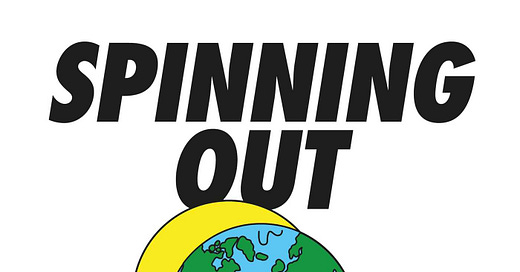Review of Charlie Hertzog Young's "Spinning Out"
WARNING: This review contains some discussion of suicide and severe mental distress. (But there are positive bits too).
At the start of Spinning out, Charlie Hertzog Young describes how he jumped off a six storey building. He was extremely lucky to survive, but ended up having both legs amputated. This act was the culmination of a sequence of traumatic events that led to a moment of total despair. It began when he was twelve, with a dawning understanding of the severity of climate breakdown and the suicide of his grandmother.
He states that afterwards “For years climate change was my everything” which loomed over him “as an unpredictable harbinger of death.” (p. 2). He later became a climate campaigner, attending protests at number 10 and at the “hallowed wankery” of the World Economic Forum. Then in 2009, after the collapse of the UN climate talks in Copenhagen, he had an “incandescent breakdown.” (p. 4). This led to hospitalisation and a diagnosis of bipolar disorder. It ended with his jump off the six storey building.
Yet this was not the end of the story. Charlie has managed to transform considerable mental and physical suffering into gold. He’s produced an extraordinary, compelling book that will be invaluable to anyone who suffers from “Climate anxiety” or worse.
The book’s split into three parts. Part one discusses the still taboo topics of climate anxiety, despair and trauma. It includes a chapter on our “managed madness,” the conclusion being that “Our civilisation has fundamentally disordered our climate. The climate is disordering our minds.” (p. 25). The civilisational conceit of total control over nature has been answered by fate; the goddess Nemesis has rewarded us with widespread madness. But unfortunately, those suffering most are not those directly responsible, and include the ever-multiplying victims of climate disaster. Charlie claims that such “suffering is not understood, rarely shared and exists mostly in the deep, dark and lonely recesses of minds scattered across the globe.” (p. 25).
He sees the central problem as a particular way of being in the world that he calls ‘Extractivism.’ Extractivism underlies more superficial concepts like “Provenance, Progress, Empire,”, “Capitalism” or even “Enlightenment.” (p. 230). “Extractivism forces the insatiable pursuit of one thing: extracting life from living things. It sucks the life from lands, from bodies, from minds.” (p. 230). It is the “engine within civilisational expansion.” Hertzog sees it as having two “beating hearts:” disconnection and domination. A disconnect from other people and the natural world leads to a desire for ruthless domination. This resonates with another book I’ve been reading recently: Steve Taylor’s Disconnected, which points to the separation illusion as being at the root of human evil.
Many are seeking solutions to humanity’s predicament. In part two, Charlie visits Nigeria, Pakistan and Mexico in search of a better way. Nigeria has in recent years suffered from terrible floods, and also lacks basic provision for many with mental health problems. Charlie talked to Jennifer Uchendu who fights for climate justice via her organisation SustyVibes in Lagos. In Pakistan, melting glaciers, floods and no help for mental health has spawned tree-planting and mental health coops. In Mexico, suffering under the weight of a brutal colonial history, psychedelics, sorcery and shamanic ritual operate as effective therapies for mental suffering. The lesson is that despite formidable opposition, seedlings of transformation have already begun to sprout.
Part Three offers a road-map for change. This is detailed in chapter seven, “Regenerative Rebellion: climate action as recovery.” As the title suggests, Charlie links recovery from mental suffering with campaigning and organising for social and cultural change. This happens in three stages, which Charlie labels Resist, Reconnect and Remedy. These steps are further detailed in subsequent chapters (8—10). Resist means stopping harm, which can be “physically dismantling fossil fuel infrastructure or simply resting and recuperating.” (p. 155). Reconnect means finding community, because no-one can do this alone. Remedy means the “process of imagining and implementing different worlds….” (p. 155). These changes are facilitated by deepening democracy and participation. This is necessary because “Deeper democracies tend to empower people far more than centralised hierarchies.” (p. 171).
Throughout the book, Charlie returns to the idea that there’s wisdom in mental suffering. He suggests that “climate breakdown and mental breakdown are vital forms of feedback, saying that something is deeply wrong and giving us coded pointers for how to change….” (p. 229). He even suggests that profound change might require the input of people who are slightly crazy. He states that “systemic visioning and reworking requires a touch of madness: lunacy of the best kind.” (p. 140). I would add to this that such change will need leaps of the imagination. I think a big part of the problem is that culturally speaking, many have become stuck in a mental rut. The machinery of extractivism rumbles on because many cannot really imagine alternative possibilities.
Spinning Out is a one-volume resource for anyone wanting to begin the daunting task of transforming global society. Not only is the book compelling and very quotable, it includes a section at the end entitled “Good Jumping Off points….” Which is a fairly succinct listing of useful organisations for environmental campaigning, social transformation and mental health. There’s also a list of “utopian,” inspiring books.
I’m also adding it to the small but exclusive list of books to which I turn when feeling demoralised and depressed. These include Gwyneth Lewis’ Sunbathing in the Rain, Bruce Levine’s Surviving America's Depression Epidemic and Brick’s graphic novel Depresso. Spinning Out compliments these books but goes beyond them because it reframes mental distress as an integral part of the ecological crisis. The message: we’re not isolated individuals with “mental illness” but sensitive, deeply interconnected beings alive to the Earth’s distress. Highly recommended.
SPINNING OUT by Charlie Hertzog Young
Footnote Press, 2023, 279 pp.,p/b — ISBN 978-1-804-44031-5
Charlie’s website: https://charliehertzogyoung.me




